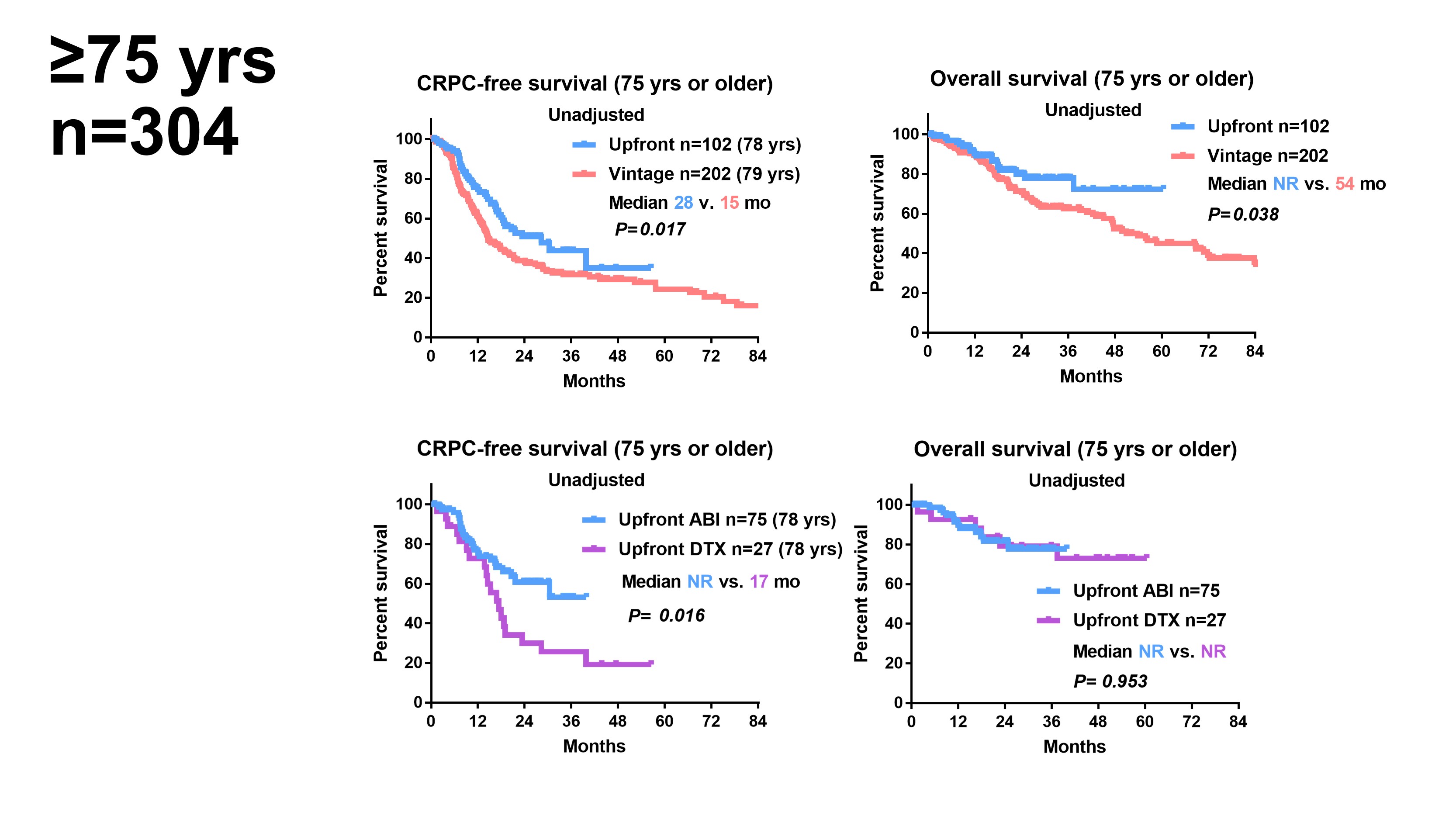Back
Poster, Podium & Video Sessions
Podium
PD35: Prostate Cancer: Advanced (including Drug Therapy) II
PD35-11: The impact of older age on the oncological outcomes for high-risk metastatic hormone-sensitive prostate cancer treated with upfront intensive therapy
Sunday, May 15, 2022
8:40 AM – 8:50 AM
Location: Room 252
Shingo Hatakeyama*, Hirosaki, Japan, Shintaro Narita, Akita, Japan, Takahiro Kimura, Kenichi Hata, Takafumi Yanagisawa, Tokyo, Japan, Norihiko Tsuchiya, Senji Hoshi, Yamagata, Japan, Shigeto Ishidoya, Sendai, Japan, Sadafumi Kawamura, Natori, Japan, Akihiro Ito, Sendai, Japan, Shin Egawa, Tokyo, Japan, Tomonri Habuchi, Akita, Japan, Chikara Ohyama, Hirosaki, Japan
- SH
Shingo Hatakeyama, MD
Dept. of Urology, Hirosaki University Graduate School of Medicine
Podium Presenter(s)
Introduction: The impact of older age on the prognosis for high-risk metastatic hormone-sensitive prostate cancer treated with upfront intensive therapy remains unclear. We aimed to assess the impact of older age (75 years or older) on oncological outcomes in patients with CHAARTED high-volume metastatic castration-sensitive prostate cancer between patients with androgen deprivation therapy (ADT) plus upfront docetaxel (DTX) or abiraterone acetate (ABI) plus prednisolone and vintage therapy (ADT monotherapy or combined androgen blockade).
Methods: This multicenter retrospective study included 294 and 521 patients in the upfront group (DTX: 95 and ABI: 199 patients) and in the vintage group (ADT monotherapy), respectively. Of 815, we identified 304 patients aged 75 years or older. We compared castration-resistant prostate cancer-free survival (CRPC-FS) and overall survival (OS) between the upfront and vintage groups. Multivariable Cox regression analysis was performed to access the effect of upfront intensive therapy on prognosis in the older age population.
Results: Of 304, we identified 102 and 202 patients in the upfront group (DTX: 27 and ABI: 75 patients and in the vintage group, respectively. The proportion of older patients were 35% (n=102/294) in the upfront group and 39 (n=202/521) in the vintage group. In the older patients, the upfront group had significantly prolonged CRPC-FS and OS compared with the vintage group. CRPC-FS were significantly longer in patients with upfront ABI therapy than those with upfront DTX therapy, but OS was not significantly different between the upfront ABI and DTX therapies. Multivariable Cox regression analysis showed the upfront group was significantly prolonged CRPC-FS and OS.
Conclusions: The upfront intensive therapy significantly prolonged CRPC-FS and OS compared with the vintage therapy in the older population in real-world patients.
Source of Funding: None

Methods: This multicenter retrospective study included 294 and 521 patients in the upfront group (DTX: 95 and ABI: 199 patients) and in the vintage group (ADT monotherapy), respectively. Of 815, we identified 304 patients aged 75 years or older. We compared castration-resistant prostate cancer-free survival (CRPC-FS) and overall survival (OS) between the upfront and vintage groups. Multivariable Cox regression analysis was performed to access the effect of upfront intensive therapy on prognosis in the older age population.
Results: Of 304, we identified 102 and 202 patients in the upfront group (DTX: 27 and ABI: 75 patients and in the vintage group, respectively. The proportion of older patients were 35% (n=102/294) in the upfront group and 39 (n=202/521) in the vintage group. In the older patients, the upfront group had significantly prolonged CRPC-FS and OS compared with the vintage group. CRPC-FS were significantly longer in patients with upfront ABI therapy than those with upfront DTX therapy, but OS was not significantly different between the upfront ABI and DTX therapies. Multivariable Cox regression analysis showed the upfront group was significantly prolonged CRPC-FS and OS.
Conclusions: The upfront intensive therapy significantly prolonged CRPC-FS and OS compared with the vintage therapy in the older population in real-world patients.
Source of Funding: None


.jpg)
.jpg)